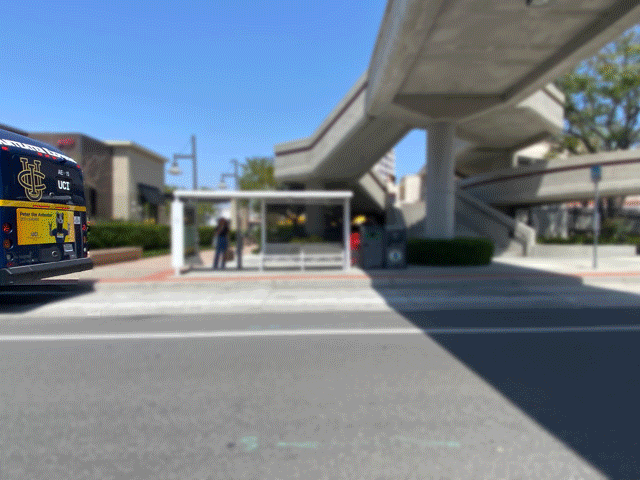Meet LPS Ph.D. candidate and ethics expert Jessica Gonzalez
As she nears the end of her time on campus, the graduate Anteater reflects on her
UCI experience

You may recognize Jessica Gonzalez from a recent bus ad for UCI. The Ph.D. candidate in the Department of Logic and Philosophy of Science (LPS) studies the role that science plays in our moral processes. As her time as an Anteater comes to a close, she reflects upon the experiences that enriched her graduate studies.
My parents met at UCI, so being an Anteater is in my blood.
Destined to be an Anteater
“My parents met at UCI, so being an Anteater is in my blood,” she says.
“I was raised in OC and am a product of the California public school system.” After high school, she attended Irvine Valley College and then transferred to UCLA.
“I wanted to get my Ph.D. but I had a difficult time finding mentors to help me understand that process,” she says. “I was encouraged to apply to master's programs instead.”
She ended up earning her master’s degree in philosophy from Cal State LA. Shortly thereafter, she moved to Hawaii where her husband’s family is from and where she had an opportunity to teach on the tenure track at Hawaiʻi Community College. The seven years she spent there gave her an opportunity to explore her philosophical interests and engage with students about science, culture, and philosophy. These conversations led to real world application for her students when a project was proposed to build a large telescope on top of a dormant volcano that has significance to the native population. Gonzalez would take her students to the site, follow protocols in terms of paying respects to the land, and engage in discussions about the clash between scientific and cultural values.
When family circumstances led Jessica back to Orange County, she decided to finally apply to Ph.D. programs with UCI being a top choice. LPS drew her attention because of departmental strengths in the philosophy of mathematics.
“My first advisor in the program at UCI was Penelope Maddy, who is internationally known for her theories on a naturalized version of math. Her work really brought me to LPS,” Gonzalez says.
Soon after arriving at UCI, she got an email about the UCI Ethics Center running a summer internship program.
“I liked ethics and I also missed teaching,” she says. “This changed the trajectory of my time here.”
Gonzalez had been focused on mathematical cognition when she started working with the Ethics Center. As she spent more time mentoring students, she found her work at the center complemented coursework she was doing in the department on the evolution of morality. These new interests moved Gonzalez’s focus from mathematical cognition to studying the cognitive underpinnings and evolution of morality, while working these ideas out with the center’s motivated and insightful interns.
The program’s director - Kristen Monroe, political science Distinguished Professor - became an important informal mentor, helping Gonzalez progress in her thinking about ethics, and serving on her dissertation committee.
“I met Jessica when she volunteered to teach a summer module for the UCI Ethics Center, which I direct. Teaching a module involves bringing students to work with you on a project, teaching them about doing research by involving them in your own research. She offered a module on human cognition and how the way we process information and think about issues affects our moral behavior,” Monroe says. “The students loved her, and the next year, the Ethics Center asked her to teach two modules, both of which had more students than we could accommodate.”
Monroe says that she has learned a lot from Gonzalez about moral cognition and the experimental philosophy movement. The crux of Gonzalez’s dissertation research argues that we should use science to make better moral decisions. At the Ethics Center, interns would share stories about how they made real-life ethical decisions in ways that were shaped by the research they read. This was a rewarding experience for Gonzalez as she was observing the correspondence between theory and practice.
Gonzalez’s current advisor is Kyle Stanford, LPS professor, who has helped her investigate what she cares about at the intersection of cognitive science and ethics/morality.
As a graduate student, Gonzalez has been a teaching assistant and instructor of record for a few undergraduate courses. She’s also taught philosophy at Occidental College, and she was recently offered a tenure track position in philosophy at Orange Coast College (OCC).

Taking it all in stride
When the pandemic struck, the lack of social interactions changed her graduate school experience, but not her drive.
“The pandemic hit in my third year, so in a lot of ways the experiences of my third and fourth year were very different because we were physically distancing, and the social dynamic was different,” she says. “But I will always remember my time on campus and spending time at the Phoenix Grill with my cohort where we would have coffee, work on homework, and have discussions that helped form the path that I'm taking.”
Other activities that have been helpful to her success at UCI include participating in a writing group with Barbara Sarnecka, cognitive sciences professor, and participating in the PRE-Professor Program (PREPP) - an experience designed to expose graduate students to the CSU system and prepare Anteaters for potential faculty positions. Being knowledgeable about the CSU system will be helpful, she says, as she teaches and advises community college students.
Although Gonzalez has enjoyed her research and working on her dissertation, she’s most excited about teaching and growing in her role at OCC.
“What I have learned in doing research is that teaching is what gets me most energized in a way that some of the other activities that we do as graduate students don't. I'm open to getting back into research at some point, and I would love for that to happen in a way that's synergistic with my role at OCC,” she says. “I’m looking forward to using my research skills to help students develop their own questions and projects and guide their inquiry.”
- Adriana Maestas for UCI Social Sciences


connect with us: